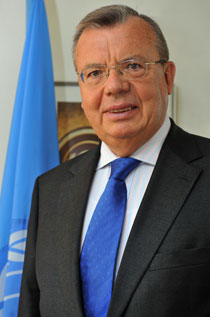Remarks of the Executive Director, UN Office on Drugs and Crime (UNODC), Yury Fedotov:
Statement at the OSCE-wide conference on the nexus between illicit drugs, organized crime and terrorism
10 July 2017
 VIENNA, 10 July (UN Information Service) – Terrorism, and its links to drugs and crime, is recognized, including by the UN Security Council, as a threat to global peace, security and development.
VIENNA, 10 July (UN Information Service) – Terrorism, and its links to drugs and crime, is recognized, including by the UN Security Council, as a threat to global peace, security and development.
It is also widely acknowledged that terrorists and extremists require funding for their heinous acts, and criminal activity is often a major source for such funding.
Although information is fragmented, our analysis reveals a number of terrorist groups prospering from their involvement with criminal activities.
In Afghanistan, UNODC estimates that the Taliban last year raised a minimum of 150 million USD, around 50 per cent of their total income, from taxes and direct involvement in the illicit opiate trade.
Boko Haram has helped smuggle heroin and cocaine, as well as trafficked people and natural resources across West Africa. Further north, Al-Qaida in the Islamic Maghreb is thought to be involved in cannabis and cocaine trafficking.
Profit-driven links exist in East Africa between Al-Shabaab and Somali pirates, and the terrorist group is also thought to be widely implicated in the charcoal smuggling trade.
ISIL is involved in brutal kidnappings for ransoms, cultural property trafficking, as well as the illegal trade in oil.
Further research is needed in all these cases, but they illustrate the cooperation that exists between terrorism and crime.
The thematic chapter of UNODC’s latest edition of the World Drug Report is specifically dedicated to analyzing these links, and to designing policies helping governments to take effective action.
UNODC is well positioned to support Member States in addressing the challenges of the nexus between crime, drugs and terrorism fully in line with our own mandate on terrorism prevention.
We are working jointly with many UN and non-UN partners, and I am proud to say that the OSCE is one of these close partners.
I hope that the newly established UN counter-terrorism office – UNOCT – will help to make these partnerships more effective.
An important part of our overall efforts is the promotion of the UN conventions on drugs, crime and corruption, the international instruments on terrorism, and the UN standards on crime prevention and criminal justice.
I call on every country to adopt and fully implement these international tools as the springboard for delivering greater cooperation, operational coordination and information sharing.
Since money is a taproot for these links, disrupting financial flows, including money laundering, and tackling corruption are critical.
UNODC delivers specialized training on disrupting criminal and terrorist activity, including freezing and confiscation of assets, mutual legal assistance, cross-border operations, and investigations and prosecutions.
If money drives these activities, it is the Internet that can enable them.
Cybercrime is spreading and there is enormous potential for criminals and terrorists to profit from a crime that can make victims of us all.
One of the biggest worries is the use of the Internet’s ability to spread violent ideologies, and to radicalize, recruit and train individuals to commit terrorist acts.
Working closely with UNOCT and the Counter-Terrorism Committee Executive Directorate (CTED), we are involved in a major initiative on building stronger criminal justice responses to the challenge of foreign-terrorist-fighters.
Another disturbing relationship between crime and terrorism can be seen in prisons. Vulnerable prisoners, arrested and jailed, often for minor offences, are at risk of being radicalised.
UNODC is working in many countries to promote prison reform and it is worth remembering that good prison management is based on the effective management of all prisoners, including violent extremist prisoners.
Intelligence sharing and joint law enforcement operations through such initiatives as the global Container Control Programme and Maritime Crime Programme support the prevention of crime and terrorism.
Our Networking the Networks initiative is enhancing the efforts of law enforcement bodies to cooperate at the local, regional and global levels.
Breaking both the criminal and terrorist business models is a difficult and time consuming prospect, it needs resolve, commitment, but above all resources to deliver success.
As I said at the outset, the numerous challenges laid down by drugs, crime and terrorism threaten peace, security and development.
We cannot, indeed must not, shy away from the harsh reality that crime and terrorism feed and profit from instability.
Faced by such links, we must protect progress on the 2030 Agenda for Sustainable Development, especially Goal 16 on peaceful and inclusive societies, by preventing these destructive activities.
As UN Secretary-General Guterres has stressed conflict prevention is vital to sustain the peace agenda and support human rights. We must continually strive to do our part.
Prevention efforts should always be accompanied by investments in the education of young people, and the promotion of their civic participation; the building of strong and inclusive institutions; and greater coordination at all levels.
Drugs, crime and terrorism are sometimes bound by a dark alliance; but if we unite, if we act in concert, if we chase down the profits, we can disrupt this cooperation.
I can think of no better way of assisting in the achievement of the 2030 Agenda and helping people and communities everywhere.
Thank you.
